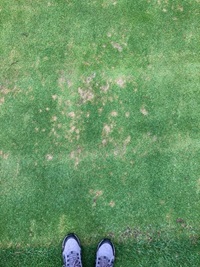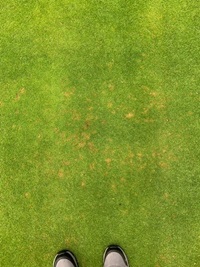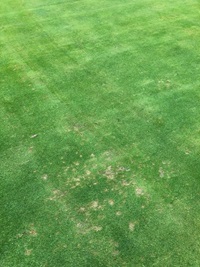Preventing Microdochium Patch with fungicides
A recent fungicide trial in Ireland shows positive results for controlling Microdochium Patch with Stressgard formulated fungicides
A trial was launched, in June 2021, at Charleville golf course in Cork to better understand how fungicide products work practically on a working golf course.
Spanning six months, the trial aimed to showcase how a range of Stressgard formulated products could prevent summer stress and tackle turf diseases.
The main focus during the early stages of the trial was turf stress . Results from this part of the trial showed how the selected fungicides had supported plant health and as a result summer stress was prevented. To read more about the results, click here.
As the trial progressed into the autumn, research shifted to focus on tackling autumn diseases such as Microdochium Patch, which can severely affect the development and health of turf.
Why is Microdochium Patch problematic?
Microdochium Patch is one of the most troubling turf diseases in the UK. It spreads rapidly and can significantly affect turf health and damage the appearance of turf.
It thrives in moist, damp conditions and can be difficult to control once an infection arises. However, it can be prevented by supporting plant health, as healthier plants are more resilient to disease.
Greenkeepers can implement an integrated control programme to prevent disease which encompasses both cultural and fungicide controls.
To learn more about Microdochium Patch and how to control it, click here.
How has the trial been carried out?
Three fungicides were applied during this trial; Signature Xtra Stressgard (an Irish exclusive product), Exteris Stressgard and Dedicate.
The applications of Signature Xtra Stressgard were mainly applied to tackle summer stress and prevent summer diseases such as Anthracnose.
The applications of Exteris Stressgard and Dedicate continued to support plant health in the latter stages of the trial and were applied to deter any autumn disease.
The timeline for the fungicide applications:
|
Date |
Product |
Application rate |
|
29 June 2021 |
Signature Xtra |
20kg/ha |
|
27 July 2021 |
Signature Xtra |
20kg/ha |
|
24 August 2021 |
Signature Xtra |
20kg/ha |
|
21 August 2021 |
Exteris |
10L/ha |
|
|
Dedicate |
0.5L/ha |
|
12 October 2021 |
Exteris |
10L/ha |
|
|
Dedicate |
0.5L/ha |
|
02 November 2021 |
Dedicate |
1L/ha |
|
23 November 2021 |
Dedicate |
1L/ha |
The timeline for fungicide applications between June and November 2021.
Applications were made across the whole course, with the exception of circular control zones, that were set up across the course where fungicides were not applied.
During the trial, the conditions were conducive to Microdochium Patch growth, particularly in the last few weeks of October. The temperatures were mild and damp, and there were many dewy nights so large infestations of Microdochium Patch were expected.
Results
Results so far have shown that across the course, levels of Microdochium Patch have been kept at a minimum, with turf growing in a healthy manner.
However, in the control zones, diseases levels have been at unacceptable levels, and the quality of the turf has therefore been impacted.


Control zones set up across the golf course, showing localised Microdochium Patch infections
Although disease has been rampant in control zones, the trial has shown that Stressgard formulated fungicides have successfully prevented autumn disease across the rest of the course.
Results also indicate that plant health across the course has been maintained. By supporting plant health, turf has a greater ability to resist disease, so this is likely to be the reason why little disease has been spotted during the trial.
The greenkeeper at Charleville golf course is delighted with the results he has seen so far during the trial and found the application programme simple to carry out.
To find out more about the benefits of Stressgard formulated fungicides, visit our product pages.

